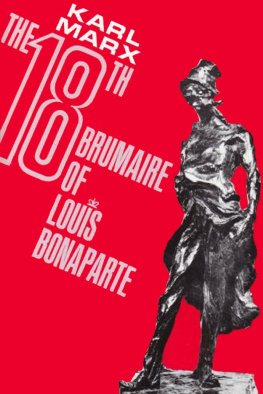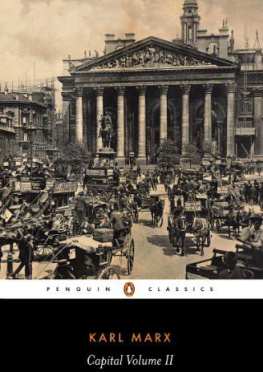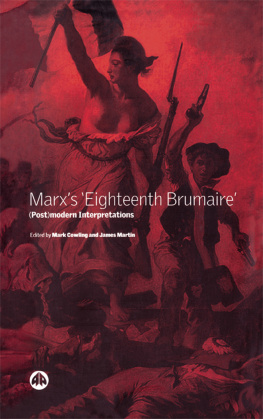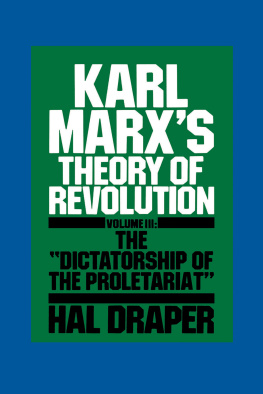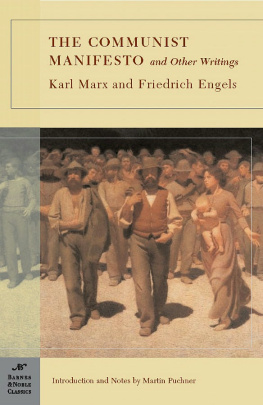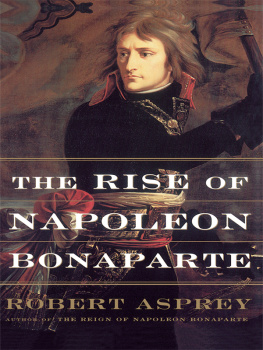Project Gutenberg's The Eighteenth Brumaire of Louis Bonaparte, by Karl Marx
This eBook is for the use of anyone anywhere at no cost and with
almost no restrictions whatsoever. You may copy it, give it away or
re-use it under the terms of the Project Gutenberg License included
with this eBook or online at www.gutenberg.org
Title: The Eighteenth Brumaire of Louis Bonaparte
Author: Karl Marx
Release Date: February 18, 2006 [EBook #1346]
Last Updated: February 6, 2013
Language: English
*** START OF THIS PROJECT GUTENBERG EBOOK LOUIS BONAPARTE ***
Produced by An Anonymous Volunteer and David Widger
THE EIGHTEENTH BRUMAIRE OF LOUIS BONAPARTE
by Karl Marx
Contents
Translator's Preface
"The Eighteenth Brumaire of Louis Bonaparte" is one of Karl Marx' most profound and most brilliant monographs. It may be considered the best work extant on the philosophy of history, with an eye especially upon the history of the Movement of the Proletariat, together with the bourgeois and other manifestations that accompany the same, and the tactics that such conditions dictate.
The recent populist uprising; the more recent "Debs Movement"; the thousand and one utopian and chimerical notions that are flaring up; the capitalist maneuvers; the hopeless, helpless grasping after straws, that characterize the conduct of the bulk of the working class; all of these, together with the empty-headed, ominous figures that are springing into notoriety for a time and have their day, mark the present period of the Labor Movement in the nation a critical one. The best information acquirable, the best mental training obtainable are requisite to steer through the existing chaos that the death-tainted social system of today creates all around us. To aid in this needed information and mental training, this instructive work is now made accessible to English readers, and is commended to the serious study of the serious.
The teachings contained in this work are hung on an episode in recent French history. With some this fact may detract of its value. A pedantic, supercilious notion is extensively abroad among us that we are an "Anglo Saxon" nation; and an equally pedantic, supercilious habit causes many to look to England for inspiration, as from a racial birthplace Nevertheless, for weal or for woe, there is no such thing extant as "Anglo-Saxon"of all nations, said to be "Anglo-Saxon," in the United States least. What we still have from England, much as appearances may seem to point the other way, is not of our bone-and-marrow, so to speak, but rather partakes of the nature of "importations." We are no more English on account of them than we are Chinese because we all drink tea.
Of all European nations, France is the on to which we come nearest. Besides its republican form of governmentthe directness of its history, the unity of its actions, the sharpness that marks its internal development, are all characteristics that find their parallel her best, and vice versa. In all essentials the study of modern French history, particularly when sketched by such a master hand as Marx', is the most valuable one for the acquisition of that historic, social and biologic insight that our country stands particularly in need of, and that will be inestimable during the approaching critical days.
For the assistance of those who, unfamiliar with the history of France, may be confused by some of the terms used by Marx, the following explanations may prove aidful:
On the 18th Brumaire (Nov. 9th), the post-revolutionary development of affairs in France enabled the first Napoleon to take a step that led with inevitable certainty to the imperial throne. The circumstance that fifty and odd years later similar events aided his nephew, Louis Bonaparte, to take a similar step with a similar result, gives the name to this work"The Eighteenth Brumaire of Louis Bonaparte."
As to the other terms and allusions that occur, the following sketch will suffice:
Upon the overthrow of the first Napoleon came the restoration of the Bourbon throne (Louis XVIII, succeeded by Charles X). In July, 1830, an uprising of the upper tier of the bourgeoisie, or capitalist classthe aristocracy of financeoverthrew the Bourbon throne, or landed aristocracy, and set up the throne of Orleans, a younger branch of the house of Bourbon, with Louis Philippe as king. From the month in which this revolution occurred, Louis Philippe's monarchy is called the "July Monarchy." In February, 1848, a revolt of a lower tier of the capitalist classthe industrial bourgeoisieagainst the aristocracy of finance, in turn dethroned Louis Philippe. The affair, also named from the month in which it took place, is the "February Revolution". "The Eighteenth Brumaire" starts with that event.
Despite the inapplicableness to our affairs of the political names and political leadership herein described, both these names and leaderships are to such an extent the products of an economic-social development that has here too taken place with even greater sharpens, and they have their present or threatened counterparts here so completely, that, by the light of this work of Marx', we are best enabled to understand our own history, to know whence we came, and whither we are going and how to conduct ourselves.
D.D.L. New York, Sept. 12, 1897
THE EIGHTEENTH BRUMAIRE OF LOUIS BONAPARTE
I
Hegel says somewhere that that great historic facts and personages recur twice. He forgot to add: "Once as tragedy, and again as farce." Caussidiere for Danton, Louis Blanc for Robespierre, the "Mountain" of 1848-51 for the "Mountain" of 1793-05, the Nephew for the Uncle. The identical caricature marks also the conditions under which the second edition of the eighteenth Brumaire is issued.
Man makes his own history, but he does not make it out of the whole cloth; he does not make it out of conditions chosen by himself, but out of such as he finds close at hand. The tradition of all past generations weighs like an alp upon the brain of the living. At the very time when men appear engaged in revolutionizing things and themselves, in bringing about what never was before, at such very epochs of revolutionary crisis do they anxiously conjure up into their service the spirits of the past, assume their names, their battle cries, their costumes to enact a new historic scene in such time-honored disguise and with such borrowed language Thus did Luther masquerade as the Apostle Paul; thus did the revolution of 1789-1814 drape itself alternately as Roman Republic and as Roman Empire; nor did the revolution of 1818 know what better to do than to parody at one time the year 1789, at another the revolutionary traditions of 1793-95 Thus does the beginner, who has acquired a new language, keep on translating it back into his own mother tongue; only then has he grasped the spirit of the new language and is able freely to express himself therewith when he moves in it without recollections of the old, and has forgotten in its use his own hereditary tongue.
When these historic configurations of the dead past are closely observed a striking difference is forthwith noticeable. Camille Desmoulins, Danton, Robespierre, St. Juste, Napoleon, the heroes as well as the parties and the masses of the old French revolution, achieved in Roman costumes and with Roman phrases the task of their time: the emancipation and the establishment of modern bourgeois society. One set knocked to pieces the old feudal groundwork and mowed down the feudal heads that had grown upon it; Napoleon brought about, within France, the conditions under which alone free competition could develop, the partitioned lands be exploited the nation's unshackled powers of industrial production be utilized; while, beyond the French frontier, he swept away everywhere the establishments of feudality, so far as requisite, to furnish the bourgeois social system of France with fit surroundings of the European continent, and such as were in keeping with the times. Once the new social establishment was set on foot, the antediluvian giants vanished, and, along with them, the resuscitated Roman worldthe Brutuses, Gracchi, Publicolas, the Tribunes, the Senators, and Caesar himself. In its sober reality, bourgeois society had produced its own true interpretation in the Says, Cousins, Royer-Collards, Benjamin Constants and Guizots; its real generals sat behind the office desks; and the mutton-head of Louis XVIII was its political lead. Wholly absorbed in the production of wealth and in the peaceful fight of competition, this society could no longer understand that the ghosts of the days of Rome had watched over its cradle. And yet, lacking in heroism as bourgeois society is, it nevertheless had stood in need of heroism, of self-sacrifice, of terror, of civil war, and of bloody battle fields to bring it into the world. Its gladiators found in the stern classic traditions of the Roman republic the ideals and the form, the self-deceptions, that they needed in order to conceal from themselves the narrow bourgeois substance of their own struggles, and to keep their passion up to the height of a great historic tragedy. Thus, at another stage of development a century before, did Cromwell and the English people draw from the Old Testament the language, passions and illusions for their own bourgeois revolution. When the real goal was reached, when the remodeling of English society was accomplished, Locke supplanted Habakuk.

